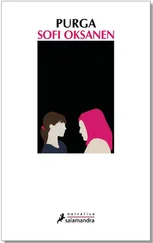The same applied to Linda. After the night at the town hall, Linda had become almost mute. She said only yes and no, only when she was asked, and she didn’t say that much to strangers. Ingel had had to explain it to people in the village by saying that Linda had nearly been trampled by a bolting horse and had been so frightened that she had stopped speaking. She said she was sure it would pass eventually. When they were in the kitchen, Ingel chatted and laughed so that Hans wouldn’t notice Linda’s silence.
Once, Aliide caught Linda stabbing at her own hand with a fork. The girl had a look about her that was absent and at the same time focused, her tight braids pulled back at the temples, and she didn’t notice Aliide. She aimed at the middle of her palm and struck. Her gaze was locked, her expression unmoving, as she pointed the fork at her hand, her mouth simply open, soundless.
For a single, fleeting moment, a voice inside Aliide urged Linda to strike again, strike harder, strike with all her strength, but as soon as the thought reached her consciousness, it was silenced by shock. You shouldn’t think those things, evil things. People who had evil thoughts were evil themselves. She ought to go to Linda, take her in her arms and pet her, but she couldn’t. She didn’t want to touch that creature, and she was disgusted; she detested her own body and Linda’s body and the thin, waxy coating that had appeared on her skin. And Linda stabbed with the fork, and raised her hand, and stabbed again, and Aliide watched, and the palm of Linda’s hand turned red. Aliide’s hands curled into fists. Lipsi barked in the yard. The bark propelled Aliide into the kitchen. Linda, glassy-eyed, didn’t move; she held on to the fork but didn’t stab again. Aliide took the fork from her, Ingel came inside, and Linda ran out. “What happened to her?”
“Nothing.”
Ingel didn’t ask any more questions, she just said it was a peculiar spring.
“We’ll be going to the fields in nothing but a sweater soon.”
The day approached. Two weeks… thirteen days… twelve… eleven… ten nights… nine… eight… seven evenings. In a week they would be gone. The house wouldn’t be Ingel’s anymore. Ingel wouldn’t wash these dishes anymore or feed these chickens. She wouldn’t make chicken feed in this kitchen or dye yarn. She wouldn’t brown the sauce for Hans or wash Linda’s hair in birch ashes and water. She wouldn’t sleep in these beds anymore. Aliide would sleep in them.
Aliide could hear herself constantly panting. She panted unceasingly, pulling oxygen in through her mouth, because her nostrils weren’t powerful enough to pull the air in. What if one of the people who decide these things changed their mind? But why would they? Or what if someone else got wind of it and warned Ingel? Who might do that? Who would want to help Ingel? No one. Why was she so restless? What was troubling her? Everything was already decided. She could relax. All she had to do was wait, wait one more week, and then move in.
In the evenings, Martin would whisper that soon they would move into their new home, and his hand would rest on her neck, his lips on her breasts, as they lay side by side in the little room with the Roosipuu children making noise, strangers banging around, and time rolled inexorably onward -six days, five nights, the hands of the clock turning like millstones, grinding fifteen past Christmases to dust-the candles on the Christmas tree and the Christmas crowns from hollowed eggshells, the birthday cakes, the hymns Ingel had sung in the choir, and the nursery rhymes she had belted out since she was a child and then taught to Linda, a clever cat with cunning eyes, sat on a stump in the woods. There was dust in Aliide’s eyes, the whites were crisscrossed with veins like ice, and she wouldn’t ever have to sit at the same table with Ingel and Linda again. There would never again be a morning like the morning they came home together from the town hall, walked for kilometers, just after dawn, the morning air fresh and quiet. A kilometer before they reached home, Ingel had stopped Linda by tugging on her arm and started to rebraid her hair. She combed Linda’s hair with her fingers, smoothed it, and started braiding it tightly. They stood in the middle of the village road, the sun had risen and a door slammed somewhere, Ingel braided Linda’s hair, and Aliide waited, hunkered down, pressing her hands against the road, feeling the little bits of limestone, not looking at the others, and suddenly her throat tightened with a terrible thirst, and she strode over to the ditch, scooped water into her mouth, tasted dirt, scooped up more water. Ingel and Linda had started walking again, holding hands, their backs receding. Aliide followed behind them, gazing toward them, looking at their backs, staring at them until they reached their own front door. At the door Ingel turned around and said, “Clean your face.”
Aliide raised her hands to her cheeks and wiped them; at first she couldn’t feel her cheeks or her hands, and then she realized that the lower half of her face was covered with snot and her neck was wet. She wiped her nose, chin, and neck with her sleeve, purged her face. Ingel opened the door and they stepped into the familiar kitchen, where they felt like strangers.
Ingel starting making pancakes.
Linda brought a jar of raspberry jam to the table. The dark raspberries looked clotted with blood. Aliide shoved Lipsi outside; they went to the table and put pancakes on their plates. Linda got honey on hers, and they passed around the jam, their plates shone like the whites of eyes, their knives slashed, their forks clattered, and they ate their pancakes with rubber lips, glass eyes shiny and dry, waxed cloth skin dry and smooth.
Five days left. Aliide woke up with a clever cat with cunning eyes playing in her head. It was Ingel’s voice. She sat up on the edge of the bed-the song didn’t go away, the sound didn’t disappear. Aliide was sure they would come back.
She wrenched her flannel nightgown over her head- with a pipe in his mouth and a cane in his hand -got into her rumpled underwear and stockings, dress on, coat, scarf in her hand, and ran out through the kitchen, grabbed the handlebars of her bicycle, threw it down, went across the fields, the fastest route to the town hall, where Martin had gone earlier that morning. She poked at her hair on the way, didn’t stop, adjusted the scarf on her head, and ran, her overshoes flapping, her coat fluttering behind her. She ran over the spring fields and across the road and strode straight across the tinkling ditch that ran along the road, Ingel’s voice in her ears- and those of them who couldn’t read, they all got pulled by the hair- singing over the numb land, and the first migrating birds flying in rhythm with Ingel’s singing, pushing Aliide forward, running the whole way, past the thrusting pussy willows, with a formation of birds in front of her, and she didn’t stop until she found Martin talking with a man in a dark leather coat. Martin’s eyes quieted Ingel’s voice. He told the men that they could continue their discussion later and took Aliide by the elbow, ordering her to calm down.
“What’s happened?”
“They’ll come back.”
Martin took out his pocket flask, uncorked it, and thrust
it toward her-she gulped and coughed. He pulled her aside, examined her as she held tight to the flask, took it out of her hands, and lifted it to her lips again.
“Have you been talking to anyone?”
“No.”
“You told them.”
“No!”
“Then what is it?”
“They’ll come back!”
“Stalin won’t let something like that happen.” Martin pulled Aliide into the shelter of his coat, and her legs stopped twitching from her running.
Читать дальше












